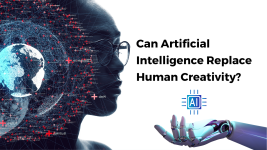With the rise of artificial intelligence (AI), a question has taken root in the minds of professionals, students, and policymakers alike: Will AI replace human jobs or create new opportunities? It's a discussion that sparks debate at dinner tables, boardrooms, and classrooms around the globe.
Since the first wave of automation, from assembly lines to computerization, humans have feared being replaced by machines. Today, that fear is amplified by AI's speed, learning capabilities, and cognitive mimicry. Algorithms now drive cabs (Uber’s AI dispatch), write news articles (Bloomberg’s Cyborg), and even pass professional exams.
According to a report by the World Economic Forum (WEF), by 2025, 85 million jobs may be displaced by machines, while 97 million new roles may emerge — a net positive, but one that comes with massive upskilling requirements. So the question is not if AI will change the job landscape, but how prepared we are.
Certain repetitive or rule-based professions are indeed vulnerable. For example:
However, these losses are just one side of the coin.
AI isn't just a destroyer—it’s also a creator. New-age roles are emerging at a rapid pace:
Even in traditional fields, AI has become an augmentation tool rather than a threat. Doctors use AI for faster diagnostics. Teachers use AI-based tools to personalize learning. Marketers use AI to analyze consumer sentiment.
Let’s face it: AI lacks emotional intelligence, creativity, moral reasoning, and human touch — all critical for leadership, customer experience, and innovation. Soft skills such as empathy, communication, and adaptability are more valuable than ever. Human judgment will continue to anchor major decisions, especially in fields like law, counseling, education, and governance.
The real risk isn’t job loss—it’s skill stagnation. The pace of AI adoption means that reskilling and lifelong learning are now essential strategies, not optional luxuries. Countries like India have launched skilling missions; companies are investing in internal AI training bootcamps; and individuals are enrolling in micro-credential programs on platforms like Coursera and Udemy.
Do you believe your job is safe from AI? What proactive steps are you taking to stay ahead of the curve? Are governments and corporations doing enough to bridge the skill gap? Share your thoughts below — let’s build a community that doesn’t fear the future but shapes it.
The Fear Is Real — But Is It Justified?
Since the first wave of automation, from assembly lines to computerization, humans have feared being replaced by machines. Today, that fear is amplified by AI's speed, learning capabilities, and cognitive mimicry. Algorithms now drive cabs (Uber’s AI dispatch), write news articles (Bloomberg’s Cyborg), and even pass professional exams.
According to a report by the World Economic Forum (WEF), by 2025, 85 million jobs may be displaced by machines, while 97 million new roles may emerge — a net positive, but one that comes with massive upskilling requirements. So the question is not if AI will change the job landscape, but how prepared we are.
Sectors Most at Risk
Certain repetitive or rule-based professions are indeed vulnerable. For example:
- Customer Support: Chatbots and virtual agents are handling millions of queries without human intervention.
- Data Entry & Bookkeeping: Tools like OCR, RPA, and intelligent document processing are replacing clerical tasks.
- Retail & Inventory Management: AI cameras and sensors are managing stocks in Amazon’s cashier-less stores.
However, these losses are just one side of the coin.
The Other Side: New Jobs, New Skills
AI isn't just a destroyer—it’s also a creator. New-age roles are emerging at a rapid pace:
- AI Ethics Officer
- Data Annotation Specialist
- Prompt Engineer
- AI Trainer (for LLMs like ChatGPT)
- Robotics Coordinator
- Digital Transformation Manager
Even in traditional fields, AI has become an augmentation tool rather than a threat. Doctors use AI for faster diagnostics. Teachers use AI-based tools to personalize learning. Marketers use AI to analyze consumer sentiment.
Human Skills Still Matter
Let’s face it: AI lacks emotional intelligence, creativity, moral reasoning, and human touch — all critical for leadership, customer experience, and innovation. Soft skills such as empathy, communication, and adaptability are more valuable than ever. Human judgment will continue to anchor major decisions, especially in fields like law, counseling, education, and governance.
So, Should We Fear or Adapt?
The real risk isn’t job loss—it’s skill stagnation. The pace of AI adoption means that reskilling and lifelong learning are now essential strategies, not optional luxuries. Countries like India have launched skilling missions; companies are investing in internal AI training bootcamps; and individuals are enrolling in micro-credential programs on platforms like Coursera and Udemy.
Let’s Start a Conversation
Do you believe your job is safe from AI? What proactive steps are you taking to stay ahead of the curve? Are governments and corporations doing enough to bridge the skill gap? Share your thoughts below — let’s build a community that doesn’t fear the future but shapes it.

